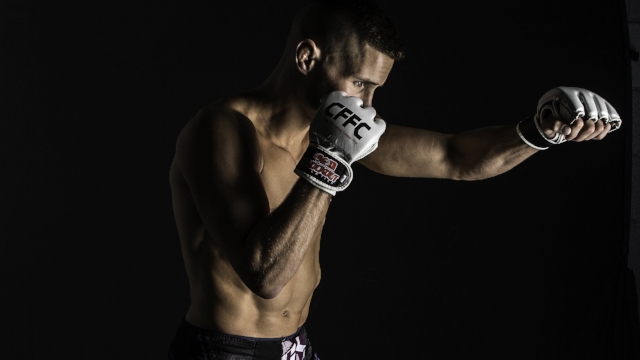This Is How MMA Fighters Conquer Fear
When a resolute young fellow steps up to the great bully, the world, and takes him boldly by the beard, he is often surprised to find it comes off in his hand, and that it was only tied on to scare away the timid adventurers.
Ralph Waldo Emerson
Fear is installed in our DNA for a host of reasons, chief among them the ability to trigger physiologist Walter Bradford Cannon's fight-or-flight mechanism. It would suit many a person well to explore the latter of Cannon's theory -- a physical scuffle has the potential to result in calamity.
That's why cage fighters, i.e. men and women choosing to engage in fisticuffs inside a steel structure, are such fascinating athletes to the press and public. They've eschewed Cannon's research and coined themselves champion of a new scientific process, one that prioritizes rest, repetition and regalia (at least in Conor McGregor's instance).
The prize for these fighters' efforts is simple: a chance to be king or queen of combat sports. A championship -- whether it's regional, national, or global -- is an indication that you've made it; you're the best. But fear still travels through the rankings, from amateur to champion.
"I guess fear [is strongest] when it comes to not wanting to get embarrassed in front of fans, friends and family... not wanting to get hurt," Cage Fury Welterweight Champion Joe Lowry said.
For some, fear is apprehension towards potential embarrassment, or not being able to perform due to injury. For others, it's a more visceral, introspective look towards the future.
"I guess not fulfilling my potential -- that would be something that I fear. If I can't make it to where I'm trying to go," Sodiq Yusuf, a featherweight MMA pro, said.
Being the powerful emotion it is, some athletes -- and more specifically combat athletes -- turn the fear of facing another human being inside a confined cage into something positive.
"It's good motivation for you to work harder," Yusuff said. "If you're just chilling during training camp you know, sometimes you might start to get lackadaisical. But a little bit of fear will put that kick into you -- getting scared of not getting beat-up in sparring and stuff like that."
"There's always a fear of failure. And, you know, that's what makes you train harder, and that's what makes you go to the gym and try harder, and eat healthy and try to be the best person you can be," Lowry said.
CFFC Welterweight Champion Joe Lowry
Most effective is the pro-active method, which prioritizes staving off negative emotions like fear or apprehension before they strike. It's an approach that's propelled Lowry, who successfully defended his title Saturday night at CFFC 68, to champion status:
"That's why I train hard. I put all the work in I use because I don't want to get hurt, and I do want to walk out of that cage without any marks on me. And I do want to walk out of the cage with my hands up.
When I walk in that cage, I leave all of that at the door, when I walk in the cage. I can't have fear in my head when I walk in there. You gotta try to leave it at the door and be ready to go."
It's important to note, especially with someone traversing through a bout of anxiety, that it's normal to feel fear: giving too much power to it, allowing fear to swarm until it feels overpowering, is a common mistake. There are nary debilitating emotions as powerful, but if you're introspective enough to recognize situations that will bring rise to it, you can thwart it effectively. Yusuff, for example, like to combat fear with confidence and work ethic.
"Even if you're a carpenter or painter, it's not just how you present your work -- it's how much work you put into it, and how much time you spent perfecting your craft," he said. "The only way to battle fear is confidence. If you haven't done the right work, then you should be scared.
If you're an artist and you put the hours in, there should be no fear. You should be confident to execute what you got. Same thing if you're a bricklayer; if you're a carpenter; if you're a plumber. It's not just fighting."
Fighters, as iron-clad as they seem, are not above reaching out for help. Although it's one man or woman that enters the cage, there is a team of professionals awaiting outside, screaming advise, pulling for their charge. That team, be it friends or family, help propel the grapplers through a rigorous training schedule and a brutal weight-cutting process. Without that help, you can bet that many warriors would fall during the arduous journey. In other words, if all else fails, and you cannot be pro-active nor can you mitigate the sting of fear and anxiety by yourself, turn to help.
"They support me," Lowry said. "And we all go through our ups and downs through life, and we're still there for each other. It's made me a stronger person for what I've been through. And that's when I go in the cage and I take it out in a positive manner."


